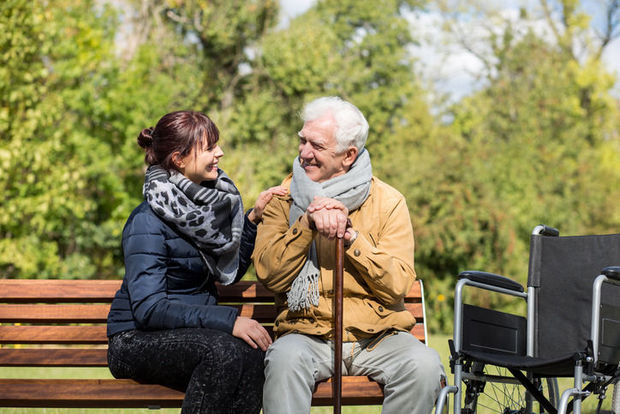As a cultural attaché for the US Department of State, Teresa Wilkin lived abroad and traveled the world, and she kept traveling, extensively, after retiring in 2004.
But it wasn’t until last year that Wilkin, 69, had what she wryly calls her “first geriatric health challenge” on the road—a bout with deep vein thrombosis (DVT), a potentially life-threatening blood clot. She had traveled without incident on a long, multicountry tour with stops in Portugal, Rome and Crete, but the last leg, a four-hour flight from Chicago to Seattle, sent her to the emergency room.
“I was in a middle seat and didn’t want to get up or bother anybody, so I slept the entire flight,” she said. “I knew something was wrong the moment I got off the plane.”
Wilkin is now in good health and still traveling—she just got back from a trip to Martinique for Carnival. But as she’s learned, travel becomes more problematic as we age. Even the most seasoned traveler must adjust for health issues, limited mobility or stamina, and take steps to avoid ailments like jet lag, motion sickness and DVT.
For older adults who want to travel, or for younger adults who wish to travel with them, the key is thorough, needs-specific research and planning. How much walking or stair climbing is on the itinerary? Can wheelchairs be used? Does the hotel have an elevator? Will there be time to rest or nonstop activities? Will restaurants be able to meet dietary restrictions? Are trustworthy medical services available?
Even a seemingly unremarkable situation can make a trip difficult and less enjoyable, said Michael Zimring, MD, director of the Center for Wilderness and Travel Medicine at Mercy Medical Center in Baltimore. On a recent trip to San Miguel de Allende in Mexico,
Zimring saw how cobblestones and narrow sidewalks turned a simple walking tour into a hair-raising ride for an older man in a wheelchair who was in his tour group.
“Older travelers really need to prepare,” he said. “The last thing you need is to be stuck in an airport because you didn’t bring the right documents for your medical syringe, or stranded in a foreign country without an adequate supply of an essential medication.”
Traveling in the Face of Ableism
Older travelers must also confront ableism—the tendency of airlines, hotels or other providers to overlook the needs of individuals with disabilities. Large hotel chains in the United States comply with the Americans with Disabilities Act (ADA); smaller hotels, both at home and in other countries, often are not held to similar standards. In some cities overseas, taxis that can accommodate wheelchairs are virtually nonexistent.
Often, ableism shows up as overlooked obstacles that are unintentional or careless, according to Debra Kerper, owner of Easy Access Travel, a Dallas-based agency that caters to older travelers and people with disabilities. She recommends using Google—her favorite travel tool—to find a travel agent or tour operator experienced in serving people with physical limitations.
“A tour guide without that specialized experience is not going to look for curb cuts or notice seemingly small obstacles that are almost impossible to navigate on a scooter,” she said.
If you’re going overseas, find out what immunizations you’ll need and have those shots at least six weeks before you set out.
Kerper prechecks each itinerary herself or contracts with local guides who’ve already led disabled travelers on the route. An inexperienced guide might assume that a restaurant with a wheelchair ramp and wide aisles is accessible, not noticing that the only bathroom requires descending a flight of stairs. A cruise ship might be designed for accessibility, but if the ship anchors and passengers are tendered (transferred from ship to shore via a smaller boat), travelers with limited mobility might be unable to join the excursion.
Kerper, 68, knows what she’s talking about, firsthand. She is a double amputee with a variety of medical conditions, including lupus; she travels along on all of the trips she organizes. Some of her clients have severe disabilities, but she says travel can be almost as challenging for people with “hidden disabilities,” such as a person with diabetes who must stop often to check blood-sugar levels or a person with a bad back who can’t sit still for long periods. Preparation is the best medicine.
Preparing for Medical Situations
One of the most important considerations is the availability of trustworthy medical care. An emergency easily handled at home could turn into a costly nightmare in an unfamiliar city, Zimring said. A hospital outside the United States may refuse to provide service unless the patient pays up front, in cash. And remote areas might not have good medical facilities. Travelers should find out in advance what health care options will be at their destination.
Zimring’s advice for healthy travel, especially overseas: consult a physician who specializes in travel medicine at least six weeks before your trip.
“If you wait until the last minute to think about immunizations, it may be too late,” he said. A vaccination for Hepatitis B, for example, is normally given as a series over a period of six months, although it can be accelerated to a six-week period.
All adult travelers should be up-to-date on routine vaccinations: seasonal flu, measles/mumps/rubella (MMR) and tetanus/diphtheria/pertussis (Tdap). Additionally, the Centers for Disease Control (CDC) recommends the shingles vaccine for those 50 and older, and pneumococcal vaccines for those over 65.
Bring copies of your prescriptions. And before you leave home, make sure your meds are legal in the countries you’ll be visiting.
Some destinations may require additional vaccines, such as polio or yellow fever; the CDC website maintains a list by destination. These vaccines may pose risks for older people, and some travelers with health conditions, like diabetes, may require additional immunizations. To navigate these complexities, Zimring recommends consulting in advance with a physician certified by the International Society of Travel Medicine; travelers can visit ISTM.org to find a practitioner in their area.
It’s also crucial to make sure all prescriptions are filled. You may need an override from an insurance carrier to make sure you have enough medication for the entire trip, plus a few extra days’ worth in case of a delay. Bring copies of your prescriptions when you travel, and make sure your medications are legal in the countries you’re visiting. (Even a legally prescribed medication can lead to disastrous consequences—a UK citizen was sentenced to three years in prison in Egypt for bringing in Tramadol, an opioid painkiller, for her husband’s back pain.) Check with the embassy of the country you’re visiting if you’re unsure. If a traveler requires oxygen, be sure to check airline policies well in advance.
If you’re traveling abroad, understand what your medical insurance will, or won’t, cover and obtain supplemental insurance as needed. (Generally, Medicare does not cover overseas care.) Read the fine print. Some policies may exclude injuries related to specific, risky activities, like riding a motorbike in Southeast Asia. Be sure to pack information on how to use your policy if needed.
If you have specific medical concerns, such as heart disease, Zimring advises doing some advance research to find out if good quality, specialized care is available, even for domestic travel. Reputable tour operators are prepared to triage emergencies—getting injured or ill travelers to a hospital, for example—but beyond that, you’ll need guidance to find good specialists. Most carriers who offer medical insurance for travelers have networks of clinicians and hospitals overseas and can assist if needed. Some credit card concierge services may also be able to assist.
Think about What You Might Not Know Before You Go
Before traveling, Wilkin always signs up online for the US State Department’s Smart Traveler Enrollment Program (STEP) for every country she’s visiting overseas. This allows her to receive safety and security advisories via email (including health-related alerts, such as Zika virus updates) and enables the US embassy to contact her should an emergency arise, whether natural disaster, civil unrest or family emergency.
Make sure you have relevant contact information (both in your phone and written down on paper) and know how to call foreign numbers if you plan to use your cellphone; check with your carrier about international limitations on your service plan. Consider downloading an app like TravelSmart from Allianz Global Assistance, which uses geolocation to find nearby hospitals, doctor’s offices and embassies, with recommendations for hospitals vetted by Allianz. (The app is free and available to all travelers but there are extra features for Allianz Travel Insurance policyholders, like claim filing.)
If one or more people on your trip has mobility issues, plan early. Accessible rooms on cruise ships fill up months in advance. Kerper is leading a cruise from Dublin to Amsterdam in 2019, and in early 2018 it was almost booked.
Visualize how you’ll navigate every step. Don’t just make reservations for a flight and a hotel; consider how you’ll move from the airplane to the curb and then to the hotel and to your room. Will you be able to easily find a taxi that can accommodate a wheelchair or should you arrange that in advance? Will you encounter cobblestones, narrow sidewalks or many stairs at the hotel? Ask your tour guide or travel agent, call the hotel or destination or go online for answers.
If you haven’t much stamina, think about renting a wheelchair or scooter at your destination. You can have it delivered to your hotel.
For group programs, read tour and excursion descriptions carefully. Many tour companies rate the accessibility and difficulty of their programs. Road Scholar, for example, has a seven-level rating system for its programs catering to older travelers, ranging from “easy going” (typically bus trips with minimal walking or stairs) to “outdoor: challenging” (vigorous exertion in rugged and steep terrain).
Kerper encourages older travelers with joint problems or limited stamina to consider renting a scooter or wheelchair even if they don’t normally need one at home. Both can be reserved in advance for delivery at a hotel or other destination. Kerper uses a rental agency like Special Needs at Sea, which serves cruise lines and hotels in all port cities. (Elsewhere, she turns to Google for local agencies; in that case, it’s a good idea to check reviews first.)
Find out about options for travelers with limited mobility. The regular tour of the famous opera house in Sydney, Australia, for example, involves a climb of more than 200 steps. But there’s also another tour for those with limited mobility, available with advance reservations.
During plane travel, Zimring said, you can help prevent DVT by choosing an aisle seat, wearing loose clothing and drinking plenty of water. Walk before and during the flight as much as possible and do leg stretches (foot flexes, ankle rotations) when seated. To minimize jet lag, Zimring advises starting to adjust your sleep schedule gradually about seven days before departure.
On the trip, avoid heavy meals, alcohol and caffeine before bedtime. Melatonin supplements may help; ask your doctor first for advice on the best time to take them.
Connecting Generations through Travel
Valerie Grubb never expected she’d become traveling companions with her mother, let alone that the two of them would cover some 400,000 miles together over 20 years, visiting destinations like Italy, Australia, China, Thailand and Cambodia.
“Travel has brought my mother and me together in a way that no number of phone calls could,” said Grubb, who has put her lessons learned and tips into a book, Planes, Canes, and Automobiles: Connecting with Your Aging Parents Through Travel (2015).
Intergenerational travel offers a way to carve out time together, reconnect in a meaningful way and have fun. Even when plans go awry, Grubb said, “It makes for a great story when we’re back home.”
If you’re planning an intergenerational trip, make sure to include activities for every member of the group to enjoy. A cruise may offer a range of options from active to sedentary; one family member can relax on the boat while another opts for an active excursion on shore. Road Scholar offers a wide array of educational, group programs designed for grandparents and their grandchildren, such as the “Exploring the Northwoods with Your Grandchild” hiking trip or “Surf and Sea San Diego,” an active outdoor adventure. Kids spend time with their grandparents but also have time to make friends with other youngsters in the group.
As the younger traveler in her duo, Grubb said it’s important for her to know her mother’s current physical condition when planning a trip. This can change significantly in a year or two. She suggests visiting the older person in advance of a major overseas vacation, to get a good sense of his or her abilities. Then, be flexible and adjust travel plans if needed.
“When Mom and I first started traveling, we’d pack lots of sights in one day,” Grubb said. “Those days are gone.”
Gradually, their travel itineraries became simpler and less demanding. In the last year or so, they’ve had to limit their travels to car trips, due to new medical problems that preclude air travel. Grubb has also noticed that her mother, now 88, has become less tolerant of cultural differences and less adaptable to change as she’s aged, and this has altered their choice of destinations.
Expect the Unexpected
Even the most thoroughly researched and mapped trips can be thrown off kilter. Chances are, there will be glitches: delayed flights, missed connections, reservations that don’t show up in the system, unanticipated health issues, weather emergencies and plain old human error.
“Glitch-free trips are the odd ones these days,” Grubb said. “Something is going to go wrong. Set your mind up for it. Expect it.”
Kerper’s advice: try to roll with unexpected snafus and see them as part of the adventure. Recently, on a Caribbean cruise, as she was leading a group of travelers who used wheelchairs, they came to a shop on Bonaire that wasn’t accessible.
“We told the shop owner that we were looking to spend our money in his shop and asked if he could put out a ramp for us,” Kerper said. The shop didn’t have a ramp, so the employees brought trays of merchandise outside and mingled with the group as they made their selections. A routine shopping stop turned into a fun cultural encounter.
Kerper added that when she makes requests for accommodations, proprietors often say they will make the changes needed so that their establishments will be accessible in the future.
And that’s one of the most rewarding parts of the job, Kerper said: she’s not just helping clients have fun, she’s building awareness. “Just because you have limitations doesn’t mean you have to stay at home,” she said.

Freelance writer Mary Jacobs lives in Plano, TX, and covers health and fitness, spirituality, and issues relating to older adults. She writes for the Dallas Morning News, the Senior Voice, Religion News Service and other publications; her work has been honored by the Religion Communicators Council, the Associated Church Press and the American Association of Orthopaedic Surgeons. Visit www.MaryJacobs.com for more.



